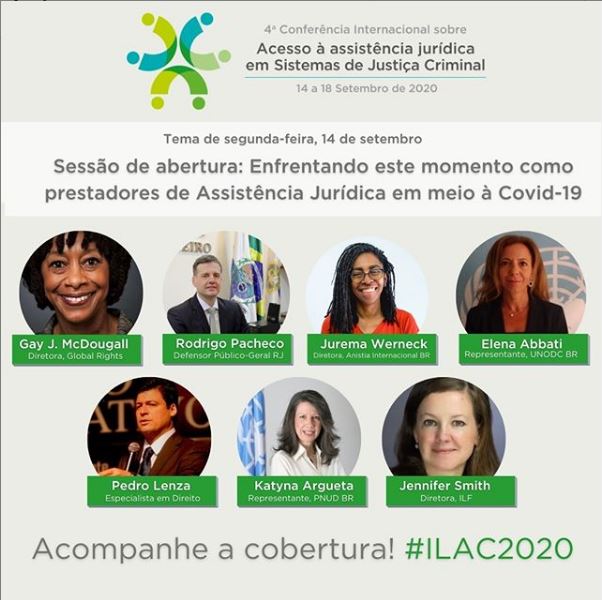Criminal justice systems and the exclusion of vulnerable persons

Effects of the pandemic on vulnerable groups were subject of the first day of international event organized by the Public Defender’s Office
In such difficult times, legal operators around the world have taken several important measures to guarantee access to justice for vulnerable persons, as well as other basic rights for those most affected by the pandemic. This was one of the several relevant topics discussed in the opening panel of the 4th International Conference on Access to Legal Aid in Criminal Justice Systems, that took place today (14). Organized by the Public Defender’s Office of the State of Rio de Janeiro, the online event closes on Friday.
The moderator of this first day of debates was the Law Specialist Pedro Lenza, who pointed out that the event was attended by more than 600 people from 75 countries. In its fourth edition, the most important world forum on the subject seeks to move forward in the search for “equal access to justice for all”, as envisaged by UN’s 2030 Agenda.
Artificial Intelligence
General Public Defender of the State of Rio de Janeiro, Rodrigo Pacheco highlighted the importance of the event in the context of the pandemic. “The effects of Covid-19 are even more devastating in an extremely unequal country like Brazil, where access to the most basic rights, such as water and healthcare, have historically been denied to the most vulnerable.”
The collective and strategic measures undertaken by the Brazilian Public Defender's Office was worth a mention, having achieved very positive results in such difficult times. The achievements include: (1) the Brazilian Supreme Court’s ban on police operations in the slums; (2) averting overcrowding in minors detention units, initiative that reduced the number of incarcerated youths in the state of Rio de Janeiro by half in comparison to data compiled before the pandemic; and (3) the decision of the State Court that obliges States and Municipalities to supply public school students with food despite the suspension of face-to-face classes.
Pacheco also affirmed that justice cannot turn a blind eye on technological advances, which are paramount to the expansion of legal aid services and to the democratization of legal information. In this context, he noted that within 20 days the Public Defender’s Office of Rio de Janeiro will launch an Application that uses Artificial Intelligence to identify and address demands, ensuring greater celerity in service provision and more rational processes.
Reinforcement of exclusion
South Africa, USA and Brazil share a structural racism culture and employ the criminal justice system to reinforce the exclusion of black people. That's the opinion of Gay McDougall, Human Rights activist who have worked in countries like Congo, Namibia, Cambodia, Bosnia and South Africa, where she took part in the electoral committee that supported the country’s first elections, putting an end to the Apartheid regime. “In the numerous countries where I worked, I learned valuable lessons about the transformative power that access to legal aid has on people,” she said.
McDougall explained that the USA, South Africa and Brazil also relegate certain segments of society to the base of the labor market, inadequate health care, low quality education, precarious housing and limited security mechanisms. South Africa has taken constitutional measures to protect the population, but in the US and Brazil, some communities have inherited a subordinate social status that continues to strip them of political power and legal resources in justice systems. “The United States has by far the largest prison population in the world. Brazil ranks third on that list.”
Before ending her participation, the activist stressed that any changes to the legal system must be profound, and expressed concern about the prospect of the US government increasing the allocation of public funds for the military at the expense of health, housing, water treatment, etc. “There should also be accountability when it comes to the application of corrective measures at national and international levels.”
Nobody is left behind
Elena Abbati, Resident Representative of the United Nations Office on Drugs and Crime (UNODC) in Brazil, stressed the fact that legal assistance receives more attention in certain countries than others, which is largely due to civil society partnerships. “One of the most important principles on the UN agenda is to leave no one behind, including the poorest and most marginalized.”
She agrees that the pandemic has created unprecedented challenges for criminal justice systems; on the other hand, several measures have been taken and good practices identified. “One could mention, for instance, the reduction of the risk of COVID-19 contamination in detention centers, greater promotion of basic legal aid access to the population and assistance to victims of violence, including gender violence, which has greatly increased in the pandemic.”
UNODC confirms its ongoing support to governments, civil society and other international efforts to ensure access to legal aid and basic social protection services for all. “May this conference serve as a forum for discussing good practices”, she said. Also representing the United Nations, Katyna Argueta, Resident Representative of UNDP Brazil, noted that the groups that faced challenges in the past now face even greater challenges. However, she sees difficulties as an opportunity for justice system innovation via digital transformation and business contingency plans. “Justice systems cannot go back to what they were before the pandemic. The have to promote relevant international discussion and cooperation.”
State negationism
Brazil was dramatically hit by the pandemic. Covid has already killed 132,000 people and infected over 4 million individuals tested positive, without taking into account the enormous underreporting. “Only 13 in every 1,000 Brazilians have access to appropriate testing. Experts believe that there are five, seven or 12 times more infected people who are not being tracked”, notes Jurema Werneck, Founder of the NGO Criola and Director of Amnesty International - Brazil
The bleak scenario, according to her, can be attributed to state/governmental negativism, which has led the federal administration to fail to fulfilling its duties to protect the population’s right to healthcare. “The public healthcare system has been made precarious over the years and set aside by the government. There is no coordination, healthcare professionals have not been given what it takes to care adequately for people.”
All this on top of the dramatic worsening of the financial conditions of the population, especially the most vulnerable. “There are entire families living on the streets, completely unattended. Self-employed and informal workers are on the sidelines due to Covid”, argues Werneck.
She also laments the isolation of prisoners during the pandemic, who at times have been prevented from speaking to lawyers or family; police violence, and deliberate burning with the leniency of the authorities, which expose native people to the virus.
“The digital transition imposed by Covid is met by a population that does not have access to technology”, summarizes Werneck, who suggests the creation of organizations and mechanisms to mediate access to justice and the reinforcement of affirmative actions.
Prison situation
This Tuesday (15) panel the Americas panel starts at 10 am and will discuss the Protection of the Rights of Persons Deprived of Liberty, featuring names like the Brazilian Public Defender and Coordinator of Custody Hearings Office Caroline Tassara; Luis Lanfredi, from the National Justice Council; Mariano Patricio Maciel; Federal Public Defender of Argentina; Jo-Ann Wallace, CEO of the National Legal Aid & Defender Association (NLADA); Glenda Carolina Ayala Mejía, Head of the National Committee for the Prevention of Torture in Honduras, and André Castro, Public Defender in Rio de Janeiro.
Journalists interested in registering for the online conference should send an email to press@defensoria.rj.def.br. Check out the program on the website: https://ilac2020.rj.def.br.
VOLTAR






